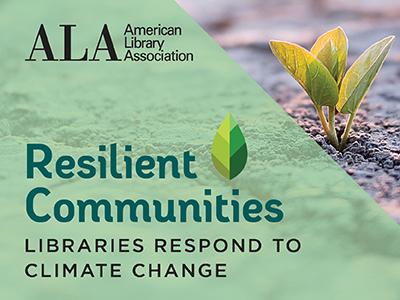The coronavirus pandemic has been a source of fear and anxiety for many of us, including children. But we can also treat the experience of living through the pandemic as an opportunity to talk to children and their families about resilience and collective action. Earth Day 2020 is the perfect occasion, and you need to go no further than your library’s YouTube or Facebook page.

Children have fertile minds in which we can plant ideas about what it means to be a responsible global citizen; how each of our actions add up; and how those actions work together to shape the world. This is a unique opportunity to instill resilience in our youngest patrons and prepare them for the challenges of climate change that lay ahead — but there is no time to lose. Children grow just as quickly as we have witnessed the world can fundamentally change -- right before our eyes.
Top 10 sustainability-themed children’s books
ALA’s Sustainability Round Table Booklist Committee has curated their list of Top 10 Sustainability Themed Children’s Books for 2020 an Earth Day story time.
These 10 notable children’s books — fiction and nonfiction — on nature, conservation and communities reflect the mission of SustainRT “to exchange ideas and opportunities regarding sustainability in order to move toward a more equitable, healthy, and economically viable society”
Children under stress can use the comfort found in “You Are Never Alone” or learn a simple way to meditate by hearing the book “Listen.” They can take a short trip and explore their backyard or a local nearby park (at a distance!) after reading “Hike” or take a trip to “see” the National Parks in “You Are Home.”
- “Sea Bear” by Lindsay Moore
- “A Stone Sat Still” by Brenda Wenzel
- “Listen” by Holly M. McGhee, illustrations by Pascal Lemaitre
- “The Hike” by Allison Farrell
- “You Are Home” by Evan Turk
- “Planting Stories: The Life of Librarian and Storyteller Pura Belpre" by Anika Aldamuy Denise
- “A Green Place to Be” by Ashley Benham Yazdani
- “What a Waste” by Jess French
- “You Are Never Alone” by Elin Kelsey, illustration by Soyean Kim
- “The Adventures of Alexander Von Humbolt” by Andrea Wulf, illustrated by Lillian Melcher
Ready-to post virtual story times
If you, like so many of us, lack access to your collection or time to create a new program from scratch, feel free to share these videos with your own patrons. Check out two examples of these brought to you by SustainRT members below.
For more recorded story times from ALA's Sustainability Round Table, visit the Programming Librarian YouTube page.
What to look for in an Earth Day story time
Are you planning your own Earth Day story time? When choosing books, consider titles that will draw children in with simple language, unique illustrations and compelling stories that showcase concepts about our connection to the planet’s natural systems and other people.
Avoid titles that miss the mark by focusing too narrowly on messages about climate change (these can come off as preachy) or wax poetically without creating a story that will hook the children in your audience.
The best stories will provide opportunities for the reader to ask dialogic questions that will give kids space to make their own connections; if you choose to do a Facebook Live story time, this is the time when the comments will start rolling in and where the magic of online engagement happens.

About Resilient Communities: Libraries Respond to Climate Change
Madeleine Charney, Beth Filar Williams, April Griffith and Juan Rubio are advisors for Resilient Communities, Libraries Respond to Climate Change, an initiative of the American Library Association. Future blog posts will cover specific program ideas that you can offer virtually over the coming weeks, including Earth Day activities and story times for all ages.
Resilient Communities will empower libraries to engage their communities in programs and conversations that address the climate change crisis. Participating libraries will receive grant funding, materials and support. All types of libraries are invited to apply beginning in July 2020; programming will begin in fall 2020.
Read the project guidelines or for more information, email publicprograms@ala.org.



